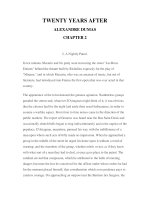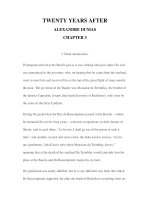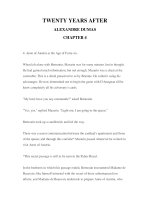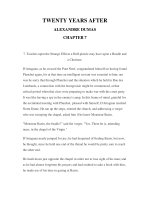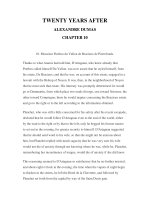twenty years after c3 5528
Bạn đang xem bản rút gọn của tài liệu. Xem và tải ngay bản đầy đủ của tài liệu tại đây (49.47 KB, 10 trang )
TWENTY YEARS AFTER
ALEXANDRE DUMAS
CHAPTER 3
3. Dead Animosities.
D'Artagnan arrived at the Bastile just as it was striking half-past eight. His visit
was announced to the governor, who, on hearing that he came from the cardinal,
went to meet him and received him at the top of the great flight of steps outside
the door. The governor of the Bastile was Monsieur du Tremblay, the brother of
the famous Capuchin, Joseph, that fearful favorite of Richelieu's, who went by
the name of the Gray Cardinal.
During the period that the Duc de Bassompierre passed in the Bastile -- where
he remained for twelve long years -- when his companions, in their dreams of
liberty, said to each other: "As for me, I shall go out of the prison at such a
time," and another, at such and such a time, the duke used to answer, "As for
me, gentlemen, I shall leave only when Monsieur du Tremblay leaves;"
meaning that at the death of the cardinal Du Tremblay would certainly lose his
place at the Bastile and De Bassompierre regain his at court.
His prediction was nearly fulfilled, but in a very different way from that which
De Bassompierre supposed; for after the death of Richelieu everything went on,
contrary to expectation, in the same way as before; and Bassompierre had little
chance of leaving his prison.
Monsieur du Tremblay received D'Artagnan with extreme politeness and invited
him to sit down with him to supper, of which he was himself about to partake.
"I should be delighted to do so," was the reply; "but if I am not mistaken, the
words `In haste,' are written on the envelope of the letter which I brought."
"You are right," said Du Tremblay. "Halloo, major! tell them to order Number
25 to come downstairs."
The unhappy wretch who entered the Bastile ceased, as he crossed the
threshold, to be a man -- he became a number.
D'Artagnan shuddered at the noise of the keys; he remained on horseback,
feeling no inclination to dismount, and sat looking at the bars, at the buttressed
windows and the immense walls he had hitherto only seen from the other side of
the moat, but by which he had for twenty years been awe-struck.
A bell resounded.
"I must leave you," said Du Tremblay; "I am sent for to sign the release of a
prisoner. I shall be happy to meet you again, sir."
"May the devil annihilate me if I return thy wish!" murmured D'Artagnan,
smiling as he pronounced the imprecation; "I declare I feel quite ill after only
being five minutes in the courtyard. Go to! go to! I would rather die on straw
than hoard up a thousand a year by being governor of the Bastile."
He had scarcely finished this soliloquy before the prisoner arrived. On seeing
him D'Artagnan could hardly suppress an exclamation of surprise. The prisoner
got into the carriage without seeming to recognize the musketeer.
"Gentlemen," thus D'Artagnan addressed the four musketeers, "I am ordered to
exercise the greatest possible care in guarding the prisoner, and since there are
no locks to the carriage, I shall sit beside him. Monsieur de Lillebonne, lead my
horse by the bridle, if you please." As he spoke he dismounted, gave the bridle
of his horse to the musketeer and placing himself by the side of the prisoner
said, in a voice perfectly composed, "To the Palais Royal, at full trot."
The carriage drove on and D'Artagnan, availing himself of the darkness in the
archway under which they were passing, threw himself into the arms of the
prisoner.
"Rochefort!" he exclaimed; "you! is it you, indeed? I am not mistaken?"
"D'Artagnan!" cried Rochefort.
"Ah! my poor friend!" resumed D'Artagnan, "not having seen you for four or
five years I concluded you were dead."
"I'faith," said Rochefort, "there's no great difference, I think, between a dead
man and one who has been buried alive; now I have been buried alive, or very
nearly so."
"And for what crime are you imprisoned in the Bastile."
"Do you wish me to speak the truth?"
"Yes."
"Well, then, I don't know."
"Have you any suspicion of me, Rochefort?"
"No! on the honor of a gentleman; but I cannot be imprisoned for the reason
alleged; it is impossible."
"What reason?" asked D'Artagnan.
"For stealing."
"For stealing! you, Rochefort! you are laughing at me."
"I understand. You mean that this demands explanation, do you not?"
"I admit it."
"Well, this is what actually took place: One evening after an orgy in Reinard's
apartment at the Tuileries with the Duc d'Harcourt, Fontrailles, De Rieux and
others, the Duc d'Harcourt proposed that we should go and pull cloaks on the
Pont Neuf; that is, you know, a diversion which the Duc d'Orleans made quite
the fashion."
"Were you crazy, Rochefort? at your age!"
"No, I was drunk. And yet, since the amusement seemed to me rather tame, I
proposed to Chevalier de Rieux that we should be spectators instead of actors,
and, in order to see to advantage, that we should mount the bronze horse. No
sooner said than done. Thanks to the spurs, which served as stirrups, in a
moment we were perched upon the croupe; we were well placed and saw
everything. Four or five cloaks had already been lifted, with a dexterity without
parallel, and not one of the victims had dared to say a word, when some fool of
a fellow, less patient than the others, took it into his head to cry out, `Guard!'
and drew upon us a patrol of archers. Duc d'Harcourt, Fontrailles, and the others
escaped; De Rieux was inclined to do likewise, but I told him they wouldn't
look for us where we were. He wouldn't listen, put his foot on the spur to get
down, the spur broke, he fell with a broken leg, and, instead of keeping quiet,
took to crying out like a gallows-bird. I then was ready to dismount, but it was
too late; I descended into the arms of the archers. They conducted me to the
Chatelet, where I slept soundly, being very sure that on the next day I should go
forth free. The next day came and passed, the day after, a week; I then wrote to
the cardinal. The same day they came for me and took me to the Bastile. That
was five years ago. Do you believe it was because I committed the sacrilege of
mounting en croupe behind Henry IV.?"
"No; you are right, my dear Rochefort, it couldn't be for that; but you will
probably learn the reason soon."
"Ah, indeed! I forgot to ask you -- where are you taking me?"
"To the cardinal."
"What does he want with me?"
"I do not know. I did not even know that you were the person I was sent to
fetch."
"Impossible -- you -- a favorite of the minister!"
"A favorite! no, indeed!" cried D'Artagnan. "Ah, my poor friend! I am just as
poor a Gascon as when I saw you at Meung, twenty-two years ago, you know;
alas!" and he concluded his speech with a deep sigh.
"Nevertheless, you come as one in authority."
"Because I happened to be in the ante-chamber when the cardinal called me, by
the merest chance. I am still a lieutenant in the musketeers and have been so
these twenty years."
"Then no misfortune has happened to you?"
"And what misfortune could happen to me? To quote some Latin verses I have
forgotten, or rather, never knew well, `the thunderbolt never falls on the
valleys,' and I am a valley, dear Rochefort, -- one of the lowliest of the low."
"Then Mazarin is still Mazarin?"
"The same as ever, my friend; it is said that he is married to the queen."
"Married?"
"If not her husband, he is unquestionably her lover."
"You surprise me. Rebuff Buckingham and consent to Mazarin!"
"Just like the women," replied D'Artagnan, coolly.
"Like women, not like queens."
"Egad! queens are the weakest of their sex, when it comes to such things as
these."
"And M. de Beaufort -- is he still in prison?"
"Yes. Why?"
"Oh, nothing, but that he might get me out of this, if he were favorably inclined
to me."
"You are probably nearer freedom than he is, so it will be your business to get
him out."
"And," said the prisoner, "what talk is there of war with Spain?"
"With Spain, no," answered D'Artagnan; "but Paris."
"What do you mean?" cried Rochefort.
"Do you hear the guns, pray? The citizens are amusing themselves in the
meantime."
"And you -- do you really think that anything could be done with these
bourgeois?"
"Yes, they might do well if they had any leader to unite them in one body."
"How miserable not to be free!"
"Don't be downcast. Since Mazarin has sent for you, it is because he wants you.
I congratulate you! Many a long year has passed since any one has wanted to
employ me; so you see in what a situation I am."
"Make your complaints known; that's my advice."
"Listen, Rochefort; let us make a compact. We are friends, are we not?"
"Egad! I bear the traces of our friendship -- three slits or slashes from your
sword."
"Well, if you should be restored to favor, don't forget me."
"On the honor of a Rochefort; but you must do the like for me."
"There's my hand, -- I promise."
"Therefore, whenever you find any opportunity of saying something in my
behalf ---- "
"I shall say it, and you?"
"I shall do the same."
"Apropos, are we to speak of your friends also, Athos, Porthos, and Aramis? or
have you forgotten them?"
"Almost."
"What has become of them?"
"I don't know; we separated, as you know. They are alive, that's all that I can
say about them; from time to time I hear of them indirectly, but in what part of
the world they are, devil take me if I know, No, on my honor, I have not a friend
in the world but you, Rochefort."
"And the illustrious -- what's the name of the lad whom I made a sergeant in
Piedmont's regiment?"
"Planchet!"
"The illustrious Planchet. What has become of him?"
"I shouldn't wonder if he were at the head of the mob at this very moment. He
married a woman who keeps a confectioner's shop in the Rue des Lombards, for
he's a lad who was always fond of sweetmeats; he's now a citizen of Paris.
You'll see that that queer fellow will be a sheriff before I shall be a captain."
"Come, dear D'Artagnan, look up a little! Courage! It is when one is lowest on
the wheel of fortune that the merry-go-round wheels and rewards us. This
evening your destiny begins to change."
"Amen!" exclaimed D'Artagnan, stopping the carriage.
"What are you doing?" asked Rochefort.

